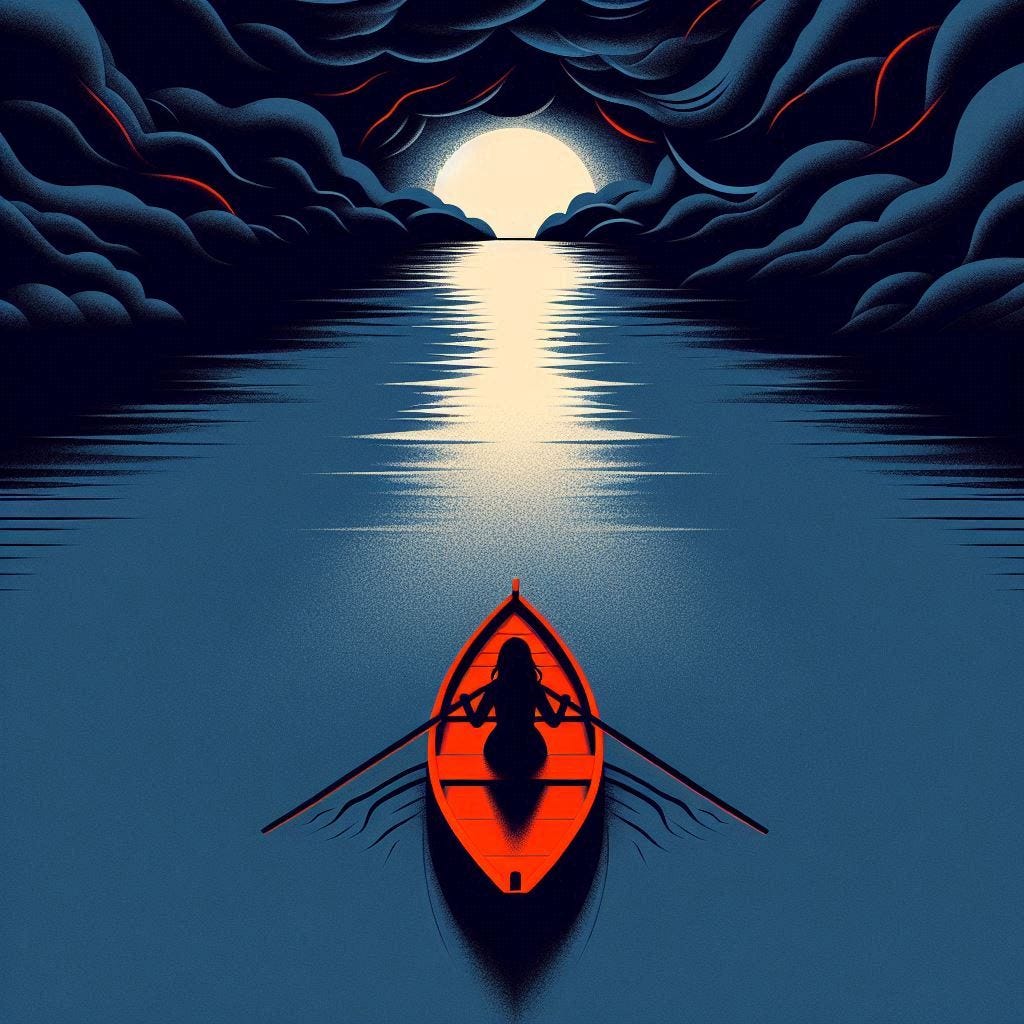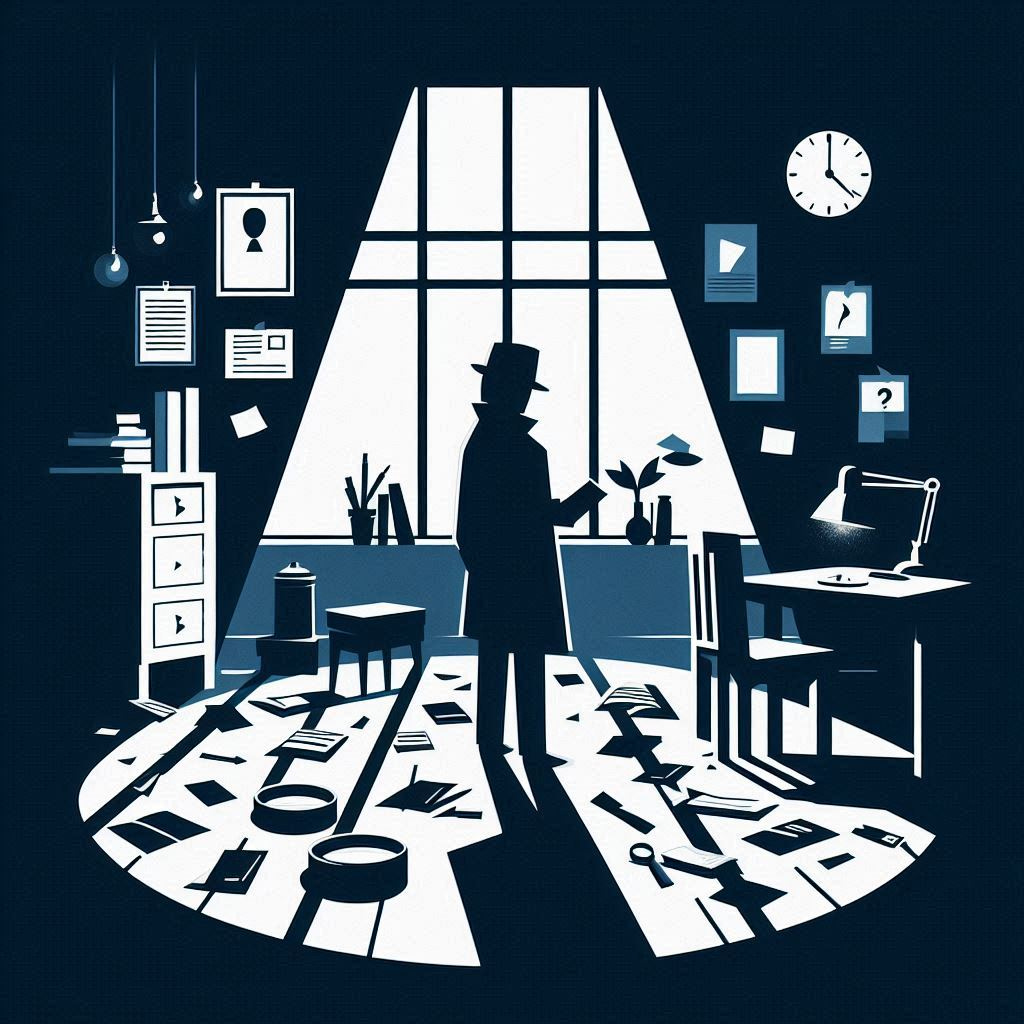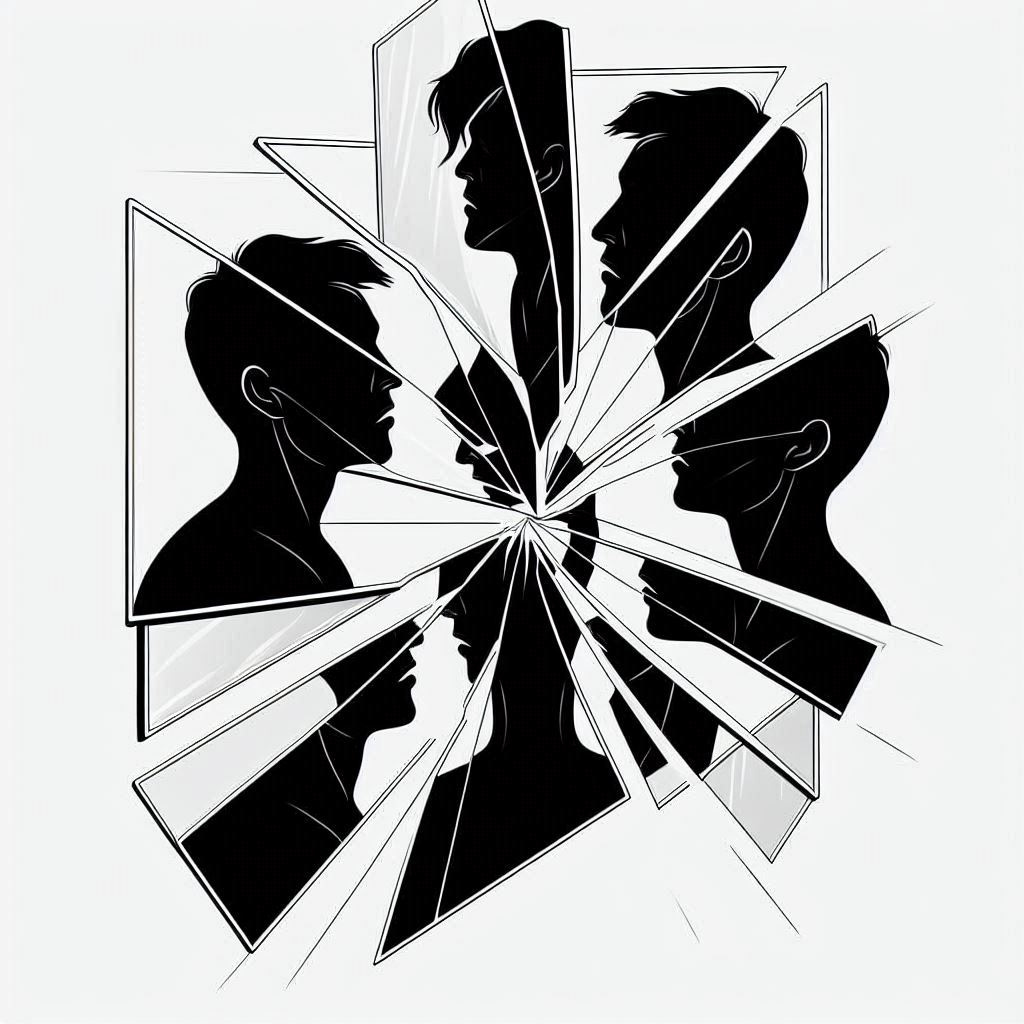To the deep thinkers,
Welcome to the Deep Thinkers Newsletter: A collection of essays dedicated to going beyond the surface.
If you’re new here, check out the Deep Thinkers archive.
I have spent most of my life trying to escape my own mind—overthinking, analyzing, and searching for answers, only to find myself trapped in a cycle of despair. But as I’ve grown older, I’ve begun to wonder: What if this inner turmoil was never meant to break me, but to wake me up?
The question—What is wrong with me?—has eaten away at me for much of my life. Growing up, my parents dismissed the very concept of depression. Yet, despite their efforts to convince me otherwise, I became increasingly aware of just how deep my despair ran.
Throughout my life, I've searched for reprieve from this despair—through accomplishments, vices, or avoidance—only to find that when the elixir of distractions wore off, the sorrow remained.
Through consultations with doctors, specialists, and deep inner reflection, I have come to realize that a single source didn’t cause my depression. Instead, my crisis of self was born from overindulgence in self-analysis and a struggle to find meaning in my existence.
This epiphany struck me at a time when everything in my life seemed to be going well. It was the stark contrast between what others saw on the surface and what I felt inside that led me to follow the thread I needed to unspool.
At 27, after a decade of failures, I began to check off some of my biggest goals. I finally earned my degree, landed a well-paying job, and moved into a nice apartment. But still, I felt empty. The joy of achieving these milestones was brief—a temporary dopamine rush. Nothing more.
Soon, I became accustomed to my new life, and the feeling that something was wrong with me returned with a fury, and the bleak realization that achieving my goals hadn’t erased the pain I carried broke something in me.
The mystery behind the sadness
The depression I want to explore in this essay is both a psychological and existential crisis—a shattering and subsequent loss of something. But what, exactly? That is the mystery. Is it the loss of innocence? Of desire? Of passion?
For those of us who dance with depression—going about our days as if everything is fine while narrowly holding on to our sanity—the question of what is wrong or missing fuels the madness. This quiet, melancholic turmoil carves a deep rift within us. Whether it creeps in like a slow, unrelenting tide or crashes down like a sudden monsoon, the result is the same—we lose touch with ourselves. And with time, joy becomes nothing more than a distant echo, something we can barely remember feeling.
To soothe this inner uneasiness, we may grasp at any coping mechanism—whether it be to feel or to avoid feeling altogether. But distractions (which are what coping mechanisms are) are such fragile remedies.
The moment the movie ends, the high wears off, or the work slows down, we're left with the same ache and the same unanswered questions. Worse yet, the more we rely on these escapes, the further we drift from ourselves.
In my darker moments, isolation is the first thing I turn to to help me cope. I withdraw from family, friends…even my partner. When I am in this state I struggle to connect with anyone, and I am left to fight a battle I shouldn’t be fighting on my own.
However, the difference between me now and myself in early adulthood is the awareness to see the problem with my desire for isolation. Honestly, I still fall back on old habits, but I am evolving—pulling myself out of the void a little quicker than I used to. Rather than run from the madness in my mind, I’ve become curious about it.
I've realized that the central mystery of my life—Why is it so difficult to escape my depression?—is less a question with a definitive answer and more an invitation for exploration and self-connection.
Instead of searching for a single solution, I have begun to wonder whether the key lies not in escaping depression but in understanding it from new perspectives. That is, approaching it with curiosity rather than fear and compassion rather than self-judgment.
Chasing happiness
It took me a long time to accept this, but sometimes depression is an invitation to change—our thinking, beliefs, or where we place our attention. It urges us to shift how we see the world, and more importantly, how we see ourselves.
At the same time, it is indiscriminate, reaching across all boundaries—wealth, status, and beliefs—consuming people from all walks of life. And so, it doesn't matter what your circumstances look like on the outside, anyone is a prime candidate to feel the grip of melancholia, as Sigmund Freud labeled it.
Personally, when I'm lost in the shroud of my mental prison, I've come to understand that it's not so much the thoughts themselves tearing me apart—it's the cycles of self-doubt, guilt, and fear that do.
In recognizing these patterns, I have begun to follow the thread back to the mystery of what has happened within me.
Like many in early adulthood, I felt lost.
While many turn to faith when they find themselves deep in the abyss, I refused. Having grown up in a strict Christian home, my break from institutional religion made returning unthinkable. And so, I pressed ahead, determined to find answers on my own, rather than waiting for a deity I no longer believed cared about me.
I made it my goal to chase happiness, but in doing so, I fell into a trap. The more I pursued it, the more elusive it became—and the more restless and disheartened I grew. Now I understand the paradox—I’ve lived it—yet I still struggle to accept it. I’ve been sad for longer than I can remember, so why wouldn’t I make happiness the goal?
...Maybe because sadness isn’t the real problem...
Maybe the real problem is treating everything as a means to an end—believing happiness is waiting at some distant finish line.
The inevitability of the end (Why bother?)
Leo Tolstoy was a well-renowned novelist and a man who was tormented by profound existential dread. Despite his success and wealth, he struggled with a deep spiritual crisis, questioning the meaning of life and the inevitability of death. His search for answers led him through philosophy, science, and religion, culminating in a personal awakening that reshaped his worldview.
In his book A Confession, Tolstoy wrote:
Thus I, a healthy and happy man, was led to feel that I could live no longer, and that my question, which brought me to the verge of suicide, was the simplest of questions, lying in the soul of every man... a question without an answer to which one cannot live.
and:
I felt that what I had been standing on had collapsed and that I had nothing left under my feet. What I had lived on no longer existed, and there was nothing left.
My life came to a standstill. I could breathe, eat, drink, and sleep, and I could not help doing these things; but there was no life, for there were no wishes the fulfillment of which I could consider reasonable. If I desired anything, I knew in advance that whether I satisfied my desire or not, nothing would come of it.
Tolstoy was a classic case of external success versus internal fulfillment. His despair ran so deep that he contemplated suicide, feeling that life was meaningless. The question that drove Tolstoy into his existential crisis and deep depression was:
"What is the meaning of my life if it will inevitably end in death?"
This question convinced Tolstoy that no matter what he accomplished, none of it mattered, because it would all be erased with his death. This revelation left him feeling that life was meaningless. If everything ended in nothingness—if it would all be swallowed up one day—then what was the point of striving for anything?
Frustrated, he turned to philosophy, only to find its answers too abstract. Next, he turned to science, hoping it could give him the answers he searched for. Unfortunately, science explained how life worked but not why it mattered. Finally, he pivoted to religion as a last-ditch effort. But as with philosophy and science, he was once again disappointed with what he found. Religion left him disillusioned by its hypocrisy, empty rituals, and contradictions. Faith, as he saw it, had become a tool of control rather than a source of true spiritual connection.
Eventually, Tolstoy found inspiration in the simple, unwavering faith of the Russian peasantry. He embraced a personal form of Christianity centered on Jesus’ teachings of love, humility, and nonviolence—believing that true faith was not about dogma but about living a life of compassion, simplicity, and moral responsibility.
In other words, he’d found the meaning to life he’d been searching for. He found his answer, but only after becoming curious enough to explore the depths of his inner pain.
Staring into the void
Tolstoy’s answer didn’t guarantee happiness for the rest of his life, but through inquiry, deep reflection, and study, he arrived at an answer that he found satisfactory. He came face to face with his pain and despair, knowing that to alleviate his suffering, he had to embark on a journey of uncomfortable self-discovery.
As we explore the source of our own pain, we must be willing to peer into the void rather than turn away from it. We must first accept our depression—which I know can feel overwhelming. It’s always easier to numb out, to find comfort in distractions and coping mechanisms.
However, a journey like this demands courage—the kind needed to face our pain from all angles, to sit with discomfort rather than flee from it. It requires a willingness to examine the wounds we’ve long ignored, to question the narratives we’ve clung to, and to embrace uncertainty.
Yet before we can do that, we must first clear the fog that obscures our connection to ourselves—the layers of doubt, fear, and avoidance that keep us from seeing our pain for what it truly is. Only then can we begin the work of understanding and healing.
This starts with the kind of healthy habits championed by self-help culture. That said, I have a complicated relationship with self-help. While there’s no denying the value of its wisdom and practical guidance, the problem occurs when people think that reading a few self-help books or going to the gym is enough to solve deep-rooted emotional issues.
Self-help is important, but it’s only the tip of the iceberg. It’s just the start of the journey. Some may need therapy, a visit to the doctor, a change in diet, medication, a shift in environment, or an increase in physical activity (whether that’s working out or simply getting more sunlight). These steps alone are unlikely to cure you of your depression, but they can make the process of facing your pain more manageable.
Think about it—if a sailor is preparing to embark on a long voyage, knowing he may face storms, treacherous waters, and many other potential threats, does he simply set sail without a plan? Of course not. He prepares. He ensures that both he and his vessel are in the best possible condition for the journey ahead. While preparation doesn’t guarantee success, it does increase our confidence in ourselves. And it’s often that very confidence that we need to keep moving forward.
So just as a sailor prepares for a voyage, we too must make the necessary preparations before taking the plunge into the darkness of our psyche.
From self-analysis to self-understanding
I've often wondered, What right do I have to feel this sad? That question alone has fueled endless self-condemnation.
But what if, instead of asking, Why am I like this? I asked, What can I learn by exploring this feeling? When pain runs deep, it carries a mystery—one that calls for investigation, not dismissal. And for those of us who struggle with profound depression, a passing shrug—the kind others offer when faced with existential questions—simply isn’t enough.
Self-condemnation won’t help, and neither will avoidance, so I turn to acceptance—realizing that depression isn’t meant to break us but to wake us up. And once we are awake, it’s up to each of us to uncover the answers our souls are searching for.
For me, I believe my answer lies in living with purpose and humility. I want to help others, but when I isolate myself, I know I’m wandering from my path—and my soul feels it. As a result, my depression deepens.
I want to find peace in faith without needing convoluted theological justifications. And rather than avoiding my pain, I want to confront it, to explore it with compassionate curiosity.
Maybe one day I’ll close the case, but I don’t think that’s the point. Life is an endless mystery—not necessarily meant to be solved, but explored and examined. Like Tolstoy, we can discover a way of living that soothes the existential angst that makes life feel unbearable.
And so, rather than relentless self-analysis, instead of chasing illusions of external success as a remedy for internal strife, I’d rather step into the void with a newfound mindset—the kind that is curious rather than judgmental.
Perhaps, before I am gone, I will finally give my soul the reprieve it has been searching for since I was a teenager. Maybe then, when I smile, it will reflect exactly what I feel on the inside.
What I’m into this week:
Heaven's for those who let go of regret
And you have to wait here when you're not all there yet
But you could be there by the end of this song
Where The Weeknd's so good and he plays all week long
Bang a gong, get it on
And if your broken heart's heavy when you step on the scale
You'll be lighter than air when they pull back the veil
Consider the flowers, they don't try to look right
They just open their petals and turn to the light
Are you listening real close? Heaven's not that, it's this
It's the depth of this moment, we don't reach for bliss
God knows life is chaos, but He made one thing true
You gotta unwind your mind, train your soul to align
And dance 'til you find that divine boogaloo
In other words
You gotta be Heaven to see Heaven
May peace be with you
—Phantom Regret by Jim, The Weeknd: Dawn FM
Much love,
- Jon ♾️






I relate to your journey so much. Going through some grief right now, and using all my tools to navigate how depressed I feel lately. Reading what you shared here reminded me of some important truths. Thank you!
Well written and an enjoyable read.
Stay Blessed!